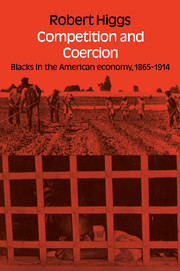Book contents
- Frontmatter
- Contents
- List of tables
- Preface
- “Race” and “racial discrimination”: A prefatory note on usage
- 1 Approaching the facts
- 2 The people
- 3 The people at work, 1865–1880
- 4 The people at work, 1880–1914
- 5 The fruits of their labors
- 6 Overview and interpretation
- Technical appendix
- Notes
- Select bibliography
- Index
5 - The fruits of their labors
Published online by Cambridge University Press: 07 October 2011
- Frontmatter
- Contents
- List of tables
- Preface
- “Race” and “racial discrimination”: A prefatory note on usage
- 1 Approaching the facts
- 2 The people
- 3 The people at work, 1865–1880
- 4 The people at work, 1880–1914
- 5 The fruits of their labors
- 6 Overview and interpretation
- Technical appendix
- Notes
- Select bibliography
- Index
Summary
Accounts of discrimination and race prejudice probably play a larger part in the formation of the popular belief concerning the colored people than do statistics of improvement.
T. J. Woofter, Jr., 1920Any assessment of black economic history in the half century after emancipation requires evidence on changes in the people's real income over time. Did freedom actually, as many appear to believe, offer little opportunity for blacks to improve their material condition? Or did they in fact participate in the rapid economic growth that characterized the American economy in the post-Civil War era? If so, did the rate of growth of black income per capita exceed, equal, or fall short of the average rate for the overall economy? Reliable estimates of incomes, classified by race, would permit one to answer these questions and shed much light on the economic history of black Americans. Unfortunately no one has attempted to construct such estimates; indeed the underlying evidence for the calculations is so scanty that the project is fraught with difficulties, some of them perhaps insurmountable. Still, the issue cannot be ignored, for unless one explicitly considers the level and growth of black incomes one is apt to slide into uncritical assumptions. Crude estimates are not necessarily more accurate than unexamined assumptions, but they have the virtue of exposing their limitations for all to see. For the years around the turn of the century, relevant data are relatively abundant, permitting an estimate of black income circa 1900.
- Type
- Chapter
- Information
- Competition and CoercionBlacks in the American economy 1865-1914, pp. 95 - 117Publisher: Cambridge University PressPrint publication year: 1977



